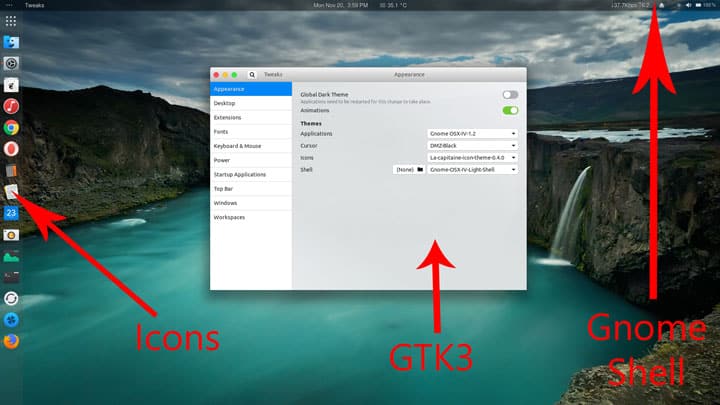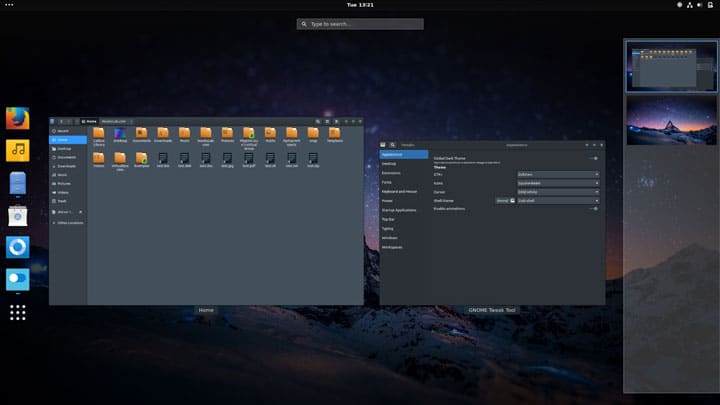The latest version of Ubuntu which is 17.10 has ditched the Unity desktop environment for good. Instead, it has adopted everyone’s favorite, Gnome desktop. Unlike Unity, Gnome is pretty customizable, and getting it to look like Unity wouldn’t have been a problem. But Canonical has already modified Gnome to make it look like Unity. And to be honest it looks better than Unity. But you don’t have to like something everyone else does because you’re using Linux. L
ike Android on smartphones, Linux is pretty customizable. Several great themes can change how your desktop looks and feels. If you’ve Ubuntu previously you know this. But since Ubuntu 17.10 brings back the Gnome desktop, you may not be familiar with how theming works. So here we’ll explain how you can install themes in Ubuntu 17.10.
Icon themes vs GTK themes vs GNOME Shell themes
Before you learn how to theme the Gnome desktop on Ubuntu 17.10, you should probably know what you want to theme. Unlike Unity, on Gnome you have the choice to theme different parts of the interface.
Icon themes
Icon themes will change the icons for the installed apps. On Unity, applying an icon pack changed the icons for everything, from the folder icons in the file explorer to the status icons in the top right. That did not always end up looking good. In Ubuntu 17.10, all you need to take care of is the icon pack supports a wide range of applications.
GTK themes
GTK is a cross-platform framework that can be used to design the user interface of an application. Many apps on Linux make use of this framework or toolkit. Therefore, installing and applying GTK themes will theme the interface for these applications. For instance, Google Chrome for Linux uses GTK. At present, Ubuntu uses GTK3 so you should download GTK3 themes.
Gnome shell themes
The Gnome shell is like the System UI on an Android device. It includes everything else such as the top bar, activity overview, desktop notifications, etc. So then obviously, Gnome shell themes will theme these elements of the Gnome desktop.
There are themes for all three elements thus giving your Gnome desktop a more uniform look. There are also many standalone Icon themes, GTK themes, and Gnome shell themes that you can combine to create your unique look.
Installing themes in Ubuntu 17.10
Themes can be installed in Ubuntu in three ways. If you like theming a lot you will at some point have to use each of the three methods. Some themes can only be installed in a certain way since there is no official standard on Linux.
1. Use PPA
Using PPA (Personal Package Archives) is one of the most common ways to install not only themes but anything on Ubuntu. The method does have its advantages. Adding a PPA to your system ensures that any updates to the package you’re installing will be automatically installed with other software updates. If a theme can be installed by adding a PPA, you will more often than not find the necessary information along with the theme. For example, to add the Zukitwo (GTK + Gnome) theme you can use the following commands.
sudo add-apt-repository ppa:noobslab/themes sudo apt-get update sudo apt-get install zukitwo
Just enter the commands one by one in a Terminal window and follow on-screen instructions to install the theme.
2. Use .deb packages
Another very popular method to install software on Ubuntu, not just themes but apps too, is through .deb packages. These are executable package files like an APK on Android or an EXE on Windows. Let’s take the Moka Icon theme here as an example. You can download the .deb package from the link below. Once downloaded, just double-click on it and the theme will be installed via the Ubuntu Software Center.
Download Moka Icon theme
Use archive files
While PPA and Debian packages are the most common method to install apps on Ubuntu, uncompressing zip files and manually placing the extracted files is probably the most common method to install themes and icons. If you’re looking all over the Internet for Ubuntu/Gnome themes you will find a zip, tar, or another kind of archive file. It can also be a much easier way of installing themes than typing commands. All you have to do is unpack the archive. Go to your Home directory then press Ctrl + H to show hidden folders and files. If you find folders named .icons and .themes, good for you. If not, you will have to manually create the folders.
If the theme you unpacked is an icon theme, move the extracted folder inside the .icons folder. In case the downloaded theme is a GTK or Gnome shell theme, place the extracted folder inside the .themes folder. To give an example, below is the link to download the Obsidian icon theme. Download the .tar.xz file and then extract it.
Since this is an icon theme, copy or cut the extracted folder and place it in the .icons folder in your Home directory. The installed themes can be easily applied via the Gnome Tweak Tool.


